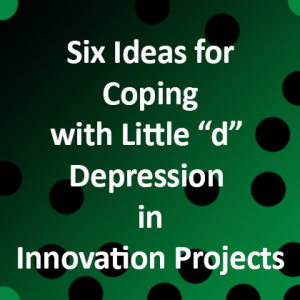…Six Ideas for Coping with Little “d” Depression…
Nobody talks about the dark emotions related to innovation.
You hear about the emotional high of a big “aha” moment. Or, less frequently, about the “oh crap” moment when a project hits a brick wall. But nobody talks about how personal battles with the dark side impact innovation.
How many promising projects have gone up in smoke because the creator, the innovator, the project leader, or a team member lost faith in a dark moment? Losing heart for something you want to do can happen when a wave of negative emotion carries you away. It’s why people give up.
Emotional highs and lows are part of life. I’m not just talking about Depression with a big D here, I’m talking about the more subtle darkness that demotivates us; makes us average. Depression with a little “d” can still be devastating.
This denial of dark feelings and moods might be the biggest unsaid, unrecognized, enemy of innovation.
I have a public speaking colleague, Steve Siebold, who talks about mental toughness, and yes, sticking to something even in dark emotional times is a key to success. But that’s easier said than done.
Maybe it’s difficult because innovation means change. Change is normally difficult and the stress can trigger dark thoughts. Then we resist the change, and quit, or, don’t move forward with that innovation project. Dr. Michael Kirton tells us that the motivation to start innovation is usually an emergency. Why do we wait until then? It’s human nature I guess and getting ahead of changes we need to make is a life skill AND an innovation skill.
I don’t have any magic solutions here. I do have a Six Ideas for Coping with Little “d” Depression — how to manage emotional lows as you work innovation projects:
- As a starter, don’t ignore it. Ignoring how you’re feeling about your project is a recipe for disaster down the road. You’ll quit or blow up a project because you haven’t coped with what’s going on. Call it by it’s name, don’t deny the darkness. If it’s really bad, get professional help.
- If there are actions to take to feel better, take them. Exercise can help. A friendly ear can help. Sometimes more complete immersion can help — double down. Finding a way to play with the challenges helps. Take actions. Get creative with finding actions you can take.
- Keep working. As much as possible keep to a schedule, keep working your project steps. Breakthrough’s often happen when you least suspect it. Unless you’re critically depressed, keep working, because things won’t happen, results won’t accrue, unless you do. Julia Cameron related a story about how writing just two pages a day can get you to a movie script draft in just 90 days. Keep after it.
- Change something. Routine can work for us, and it can also work against us. Find things you can change while still continuing to work. I have a friend who writes his best work in crowded coffee shops. He doesn’t want to talk to anyone but he likes people around. A small change can work wonders.
- Reach out to your colleagues. People rarely announce they’re depressed, down, feeling bad… and yet, if you observe and listen to your colleagues you may get the message. If you have a colleague that’s in a dark valley, reach out.
- Use Creative Problem Solving. Read Jack’s Notebook for the particulars, it’s also known as CPS.
That’s all I have on this for now. I do feel better getting this topic written about (I guess action, continuing to work even when you don’t feel like it, really does work.)




One response to “Six Ideas for Coping with Little “d” Depression in Innovation Projects”
[…] Six Ideas for Coping with Little “d” Depression in Innovation Projects Gregg Fraley […]